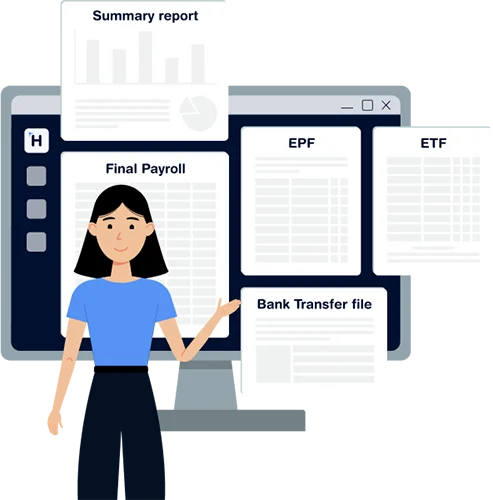With the rapid pace of technology adoption across the business landscape in Sri Lanka, businesses small and large continue to integrate components or full systems of technology in improving their internal processes, HR and related functions, as well as product and service offerings plus customer experience.
If we consider HR and employee management, from the use of fingerprint machines to streamline attendance management, and payroll software to pay staff on-time and manage employee costs better, to the use of digital signatures in expediting internal approvals, the use and acceptance of digital business technology is continuously evolving in Sri Lanka and thereby allowing for greater efficiency and more focus on the core area of business.
The trend has also seen the growing use of digital contracts by corporates, startups and SMEs locally, particularly with the introduction of the Electronic Transactions Act of Sri Lanka No. 19 of 2006, a government-introduced law that acknowledges the legitimacy of digital contracts in Sri Lanka.
However, many companies have issues and doubts concerning the use of digital employment contracts, NDAs, and so on, as there is limited information surrounding their legal use. While there are no local laws specific to digital contract use in the HR and business context, we use the Act cited above to set up the legal background to digital contracts and signatures in Sri Lanka, while displaying how they are equally legal and valid to a printed document.
The Electronic Transactions Act of Sri Lanka No.19 of 2006: the Basis for the Validity of Digital Contracts in Sri Lanka
Sri Lanka reserves the distinction of being the first South Asian country and the third country across Asia to sign the United Nations Convention on the ‘Use of Electronic Communications in International Contracts’.
The Electronic Transactions Act No. 19 of 2006 implemented in Sri Lanka follows from this landmark move, which is based on the accepted standards of the United Nations Commission on International Trade Law (UNCITRAL), Model Law on Electronic Commerce and Model Law on Electronic Signatures. It gives legal recognition and validity to carrying out transactions and effecting contracts through electronic means in Sri Lanka.
The Electronic Transactions Act of Sri Lanka No. 19 of 2006 covers the scope of ‘all business and commercial transactions which are electronic in nature’, which includes digital contracts in the HR and business context as well. Further, it adds that handwritten signatures aren’t always essential for a contract to be legal and that contracts cannot be rendered invalid on the basis of them being electronic.
While there is a lack of information and clarity across the local business community on whether this Act also applies to digital contracts specifically, they are widely used and the positive interpretation by prominent local lawyers in the ICT and HR spaces has also afforded public confidence involving their legal use.
Based on the law, the use of digital contracts is seen across a wide range of business and HR transactions locally, in everything from NDA agreements, sales and distribution agreements, and invoices, to trade and payment terms. However, there are instances where handwritten HR contracts and benefits paperwork require a hardcopy with an ink signature and affixing seal.
The Objectives of the Act in Terms of Digital Contract Use
Of its different stated objectives, found in Section 2 of the Act, there are several that apply to digital contract use and the wider aim of developing the local business plus legal framework as well as public perception and confidence. They are included below.
- To facilitate domestic and international electronic commerce by eliminating legal barriers and establishing legal certainty.
- To encourage the use of reliable forms of electronic commerce.
- To promote public confidence in the authenticity, integrity and reliability of data messages, electronic documents, electronic records or other communications.
In the context of digital contract use in HR and business scenarios, these objectives are being progressively met as indicated through the growing confidence among businesses on the legality of digital contracts plus in their growing use across a range of electronic commerce scenarios and thereby HR plus business as well.
Provisions Applicable to Implementation of Digital Contracts and Electronic Signatures
There are important legal provisions in the Electronic Transactions Act No. 19 of 2006 which regulate the manner in which digital/electronic contracts and electronic signatures are to be implemented and used in a lawful manner.
We’ve included some of the main legal provisions applicable to digital contract and signature use, below.
Legal recognition: Section 3 of the Act offers legal recognition to electronic documents including data messages, electronic records, electronic documents and other forms of electronic communication, while specifically mentioning that their legality cannot be rejected on the basis of their electronic nature. Section 26 adds to the scope of the Act, and includes definitions of these terms in the broadest possible meaning to ensure legal recognition for all types of electronic communications and transactions.
Legality of electronic instruments – According to Section 4 of the Act, data messages, electronic records and electronic documents are considered equal to records/documents that are required to be in writing.
Required minimum standards: Section 5 specifies the required minimum standards to be met where information that is generally required to be submitted or preserved in its original form are made available in electronic form via data messages, electronic records and electronic documents.
Legal standards in archiving documents electronically: Section 6 specifies the legal standards that need to be fulfilled when the retained information under any law is to be satisfied when such information is retained in electronic form. The Act therefore gives validity to the archiving of documents in electronic or digital form.
Legal recognition of electronic signatures: Electronic signatures are legally recognised under Section 7. The provisions in this section and the wider definition of electronic signatures according to Section 26 guarantee that any kind of technology related to electronic signatures will be legally recognised.
Offer and acceptance through electronic means: Section 11 through 17 of the Act sets down the process to be adopted in using digital contracts as well as the legal recognition of ‘offer’ and ‘acceptance’ seen in electronic form, in order to ease the process for businesses and consumers to form contracts electronically. Section 11 states that a contract will not be rejected for its validity or enforceability merely because it’s in electronic form.
Traditional offer and acceptance rules apply to electronic contracts: According to Section 12-14 of the Act, contracting parties are allowed to bring the traditional offer and acceptance rules when concluding contracts in electronic form.
Validity of electronic communication when forming a contract: According to Section 17, if an electronic communication is used when forming a contract, the contract will not be invalid or unenforceable.
Interpretation of technical terms: Under Section 26, the full interpretation of the term ‘electronic document’ is included, setting out that it refers to electronic documents, records, information, communications or transactions. ‘Electronic record’ on the other hand means a written document or other record that is created, stored, generated, received or communicated electronically. While ‘electronic signature’ means any letters, numbers, symbols, images, characters or any combination that is electronically applied, included or practically related to an electronic document for the purpose of verification.
Challenges in the Use of Digital Contracts
A difficulty experienced in the use of digital contracts by local businesses is the problem of proving the validity of electronic transactions (also extending to digital contracts), when a Court requires a physical document as proof. In areas such as employment litigation involving termination and other scenarios, digital employment contracts may not be admissible or may take longer to prove their validity.
The Sri Lankan Evidence Ordinance of 1895 in particular states ‘documents must be proved by primary evidence’. Here, the Ordinance clarifies that primary evidence means that the document is given to the Court to inspect. However, secondary evidence is allowed as well under Section 3 of the Evidence Ordinance of 1895, and this asserts the legal acceptance of digital evidence and contracts.
Greater Legal Validity for Digital Contracts with 2017 Amendment to the Original Electronic Transactions Act
With the advancement of technology use across business settings in Sri Lanka over the past decade, the use of digital communications, contracts, signatures, etc., in the context of HR and business grew parallelly. The need for greater recognition and legitimacy for the use of digital contracts arose locally, as a result.
Therefore, the original Act was changed in 2017 and the Electronic Transactions (Amendment) Act No. 25 of 2017 introduced changes to ensure greater efficiency and consistency in the law.
The Electronic Transactions (Amendment) Act No. 25 of 2017 was introduced to ensure better consistency of the law for local e-business merchants who intended to comply with Sri Lankan law and to ensure international legitimacy for electronic contracts and digital contracts. The amendments and greater legitimacy also extend to the use of digital contracts in the HR and business contexts, by default.
The Amended Act will secure the legitimacy of other international legal documents that are used in international agreements between local and foreign businesses as well as foreign fund transfers. This will improve the trust, confidence and legal certainty of businesses which adopt electronic means for transactions and thereby greater efficiency in business transactions.
Further, the Amendment will smoothen biometrics-based authentication technologies to smoothen the efficiency of digital certificates and various types of digital ID’s. The amended definition of “electronic signatures” is broader as it covers all the latest types of authentication methods.
Digital Contracts Present an Efficient Way Forward for Local Businesses
With the continuous development of the business landscape locally, in part due to the influence of global technology, standards, and processes, businesses ranging from startups to corporates are continuing to adopt digital contracts across areas ranging from HR to commercial transactions.
Their legality, acceptance and validity on the basis of wider use in local business plus improved government recognition, place digital contracts as a must-adopt tool regardless of size or scale of business.
Therefore, in the context of HR with employment contracts and change of employment terms letters, or in the commercial context with NDAs and the like, digital contracts present local businesses an opportunity to improve experience for their employees plus partners; streamline their HR and administrative functions;
By adopting digital contracts properly, it will save Sri Lankan businesses time and resources, so they can pay greater attention to securing better employees, effecting better partnerships, and closing higher-quality business deals.



